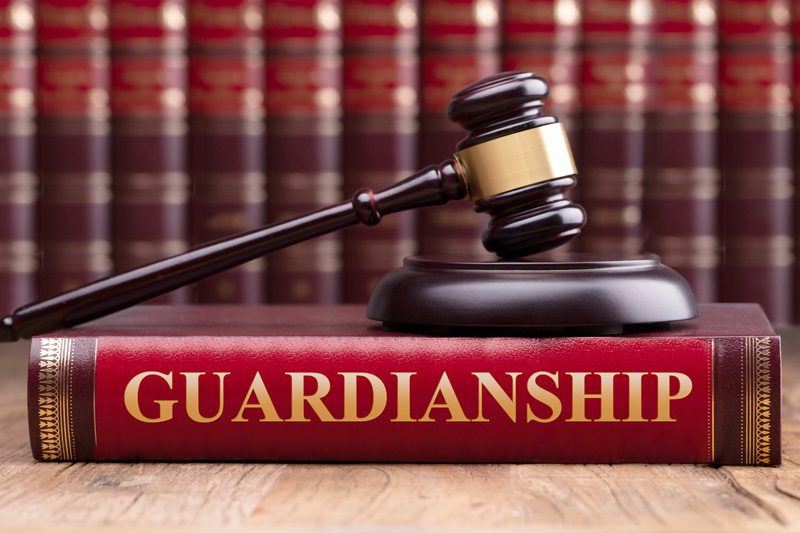Often when I encounter families with young autistic kids, they are admittedly very anxious about their child’s future. Who will take care of my child when I die? How can I make sure I am an active decision-maker in their lives when they reach adulthood, especially if they are non-speaking or have an intellectual disability? The fears, and questions, are valid and endless; while I am not a parent, I appreciate the concern.

However, the only answer they’re often presented with outside of financial planning is guardianship. You want control when your kid is still in secondary school but is over 18 but hasn’t aged out or graduated under their individualized education plan (IEP)? Guardianship. You want to control their financial future? Guardianship.
The pressure towards guardianship is everywhere – including estate planning attorneys, financial advisors, K-12 teachers, and a litany of specialists and therapists. Yet it doesn’t reflect the real needs of autistic people who need support, attainable interdependence, and their rights intact. About 1.5 million adults are under a guardianship or conservatorship today,1 and the majority of them are young people with intellectual and developmental disabilities.
At its core, guardianship is a tool to help care for a person with a disability. Realistically, guardianship is a legal proceeding in which a judge appoints a third party to make decisions on somebody else’s behalf because that person is deemed incompetent. Typically, that person is a parent or family member, but could also be a professional who is a complete stranger. It is an arrangement that is relatively simple to enter, yet incredibly difficult to end.
What’s intended as a legal last resort when no other options can ensure a person’s wellbeing has essentially become a default that leads to a “civil death”2 where one does not have the right to make their own decisions about health care, finances, relationships and marriages, and other major life things. It’s also hard to come back from that “civil death” for those who do not have the endless time, resources, and publicity to come back to life (think: Britney Spears3). At its very worse, guardianship can lead to abusive situations.4 While guardians gain an inordinate amount of control over another human being, wards under guardianship lose some of all of their of civil rights, including but not limited to where they live; where they work; what kind of medical care they get – or whether they will get any medical care; what they eat; who they spend time with; and whether they will get married.5
I find myself very fortunate that my parents did not consider guardianship as an option for me. They were in the same shoes of many of the anxious parents I meet today – Who will take care of my child when I’m no longer here? How can I make sure their future is secure? But they also believed that perhaps someday, I’d be able to make my own decisions about the job I have, where I would live, if I could vote in local, state, and federal elections. I probably would be fighting an often-unjust system in a personal capacity otherwise, the strings always being controlled by somebody else, the very opposite of the self-determination we so desperately hope people with disabilities have access to.
Here’s the thing; legally, better alternatives to guardianship that are far more compassionate and respect a person’s autonomy already do exist, and depending on where you live, there is greater progress. Options like special needs trusts and representative payees can help safeguard a financial future and manage benefits, while advance directives or power of attorney can assist with healthcare.6 At the least restrictive side, person-centered planning supportive decision-making promotes the maximum potential for self-determination.
Supported decision-making puts the person with a disability in control, allowing them to sign an agreement authorizing people they trust to assist them with making their own decisions. As of November 2022, 17 states and the District of Columbia have supported decision-making laws on the books, with other states trending towards those bills as well.7 Regardless of how much we rely on others in our daily lives, we all utilize some form of supported decision-making. Sometimes, I have difficulty with certain life decisions or want to bounce things off of my parents or friends, and I listen to their advice before deciding what’s best for me. Some of us feel more comfortable if a parent or partner comes with us to a doctor’s appointment to help voice our concerns. That is what is at the heart of supported decision-making: being able to lean on the people we choose to help us live our best lives on our own terms, and for the legal system to recognize that.
Guardianship might be the option that works best for some, but it certainly isn’t the one that works best for all. Autistic people and their families deserve to have options and carefully consider what is best – and be included in those major decisions whenever possible.
Haley Moss is a nonpracticing lawyer, neurodiversity expert, and the author of four books that guide neurodivergent people through professional and personal challenges. She is a consultant to top corporations and nonprofits that seek her guidance in creating a diverse workplace and a sought-after commentator on disability rights. The first openly autistic lawyer in Florida, Moss’ books include “Great Minds Think Differently: Neurodiversity for Lawyers and Other Professionals” and “The Young Autistic Adult’s Independence Handbook.” Her articles have appeared in outlets including the Washington Post, Teen Vogue, and Fast Company. For more information, please visit HaleyMoss.com.
Footnotes
- https://www.aarp.org/content/dam/aarp/research/public_policy_institute/cons_prot/2013/guardian-decisions-on-ltss-report-AARP-ppi-cons-prot.pdf
- https://www.centerforpublicrep.org/issue/legal-capacity-supported-decision-marking-and-guardianship
- ANYTHING BRITNEY SPEARS
- https://www.justice.gov/elderjustice/mistreatment-and-abuse-guardians-and-other-fiduciaries
- https://www.aclu.org/issues/disability-rights/integration-and-autonomy-people-disabilities/supported-decision-making
- https://disabilityrightsflorida.org/disability-topics/disability_topic_info/what_are_the_alternatives_to_guardianship
- https://www.teenvogue.com/story/britney-spears-conservatorship-reform




